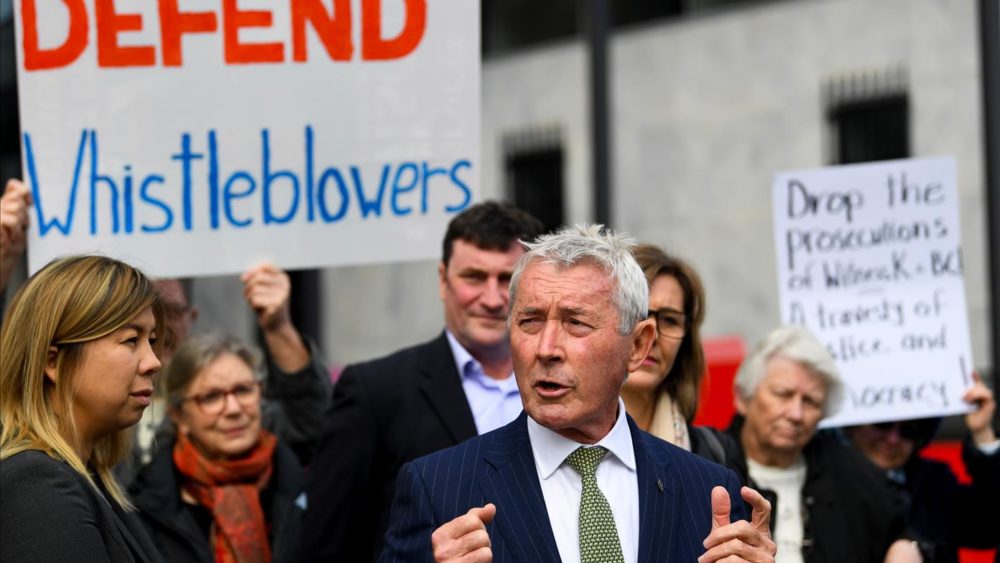The anti-democratic incursions of right-wing politics gain traction under the cover of COVID-19
Australia is widely perceived as a liberal democratic and also egalitarian country. Yet erosions of democracy in the antipodes are occurring in an incremental yet rapid manner. As Elisabeth Åsbrink notes in Made in Sweden, a reputation for social democracy can obscure the undermining of democratic norms.
Australia has a federal and parliamentary system of government, and the two major political parties are ‘Liberal’ and ‘Labor’ respectively. In the Australian context, the Liberal Party is broadly regarded as conservative and centre-right and the Labor Party as progressive and centre-left. With its coalition partner the National Party — which represents a largely rural constituency — the Liberal Party was returned to federal office in 2019 on a slim policy platform which openly appealed to fears of what a ‘radical’ Labor government might entail.
A clear move to the political right now challenges the conventional reading of the Australian Liberal Party as centrist. Critics observe that ‘the Coalition hand victories directly to the far right whenever it is expedient to do so’. In a stark assessment, Jason Wilson says “the fact that, unlike Trump’s administration, the Coalition is generally regarded as a normal, mainstream conservative government, should be no comfort [and] should be a reminder of how far things can go under the guise of normalcy.”
In response to the coronavirus, the Federal Coalition has implemented a massive stimulus package to now unemployed workers, which is supported across party and ideological lines. As recently as a few months ago, such a measure would have been unthinkable by any government claiming conservative credentials. The advent of COVID-19 has signalled a degree of bipartisanship on the management of public health in Australia.
But the emergence of COVID-19 also deflects attention from rising authoritarianism across a number of areas. The pandemic has also increased the anti-democratic incursions of right-wing politics which were already visible.
The following authoritarian measures, policies, and events constitute only some of those which could be cited. Their cumulative impact — ‘under cover of coronavirus’ — risks receiving insufficient attention in terms of the challenges posed to the health of Australian democracy:
Prosecution of whistleblowers
Prominent cases include those of ‘Witness K’ (a former intelligence officer who disclosed the bugging by the Australian government of the government of Timor-Leste for the purpose of trade treaty advantage), Richard Boyle (a former debt collection officer who exposed recovery tactics by the Australian Taxation Office), and David McBride (a lawyer whose provision to the national broadcaster of documents regarding the conduct of Australian special forces in Afghanistan led to raids on the ABC by the Australian Federal Police).
In an extraordinary and unprecedented step, the lawyer of ‘Witness K’, former ACT Attorney General Bernard Collaery is also being prosecuted: “In all three cases, the whistleblowers went through the appropriate steps to raise their concerns internally within government, before frustration at inaction led them into going public.”
Closed trials of whistleblowers
The Commonwealth has intervened to require closed trials in key whistleblower cases. ‘National security’, as Chomsky has long argued, is often invoked to conceal abuses of government power. This costly exercise of government intrusion, through which members of the legal profession including a former judge have spoken out, has ‘caused controversy in a string of cases in recent years’.
Proposal of a new security bill which vastly increases the coercive questioning powers of Australia’s major security agency
Described by the President of the Law Council of Australia as ‘a highly extraordinary and unusual measure’, the proposed bill is likely to take effect on or before 7 September 2020. This is a timeframe which impedes parliamentary scrutiny of measures wide-ranging in their impact.
Media raids by the Australian Federal Police
Recent media raids by the Australian Federal Police (one of which was subsequently ruled to be unlawful) has led to concern that investigative journalism is being ‘put in [the] same category as criminality’. In combination with stringent budget cuts to the ABC which have occurred consistently under Liberal Federal Governments, these raids further erode the capacity of the public broadcaster to report on topics and events of national significance as a robust democracy requires.
Lack of advocacy in the case of Julian Assange
Despite the high stakes in so many regards, the silence of the Australian government in relation to the untenable situation of Wikileaks founder Julian Assange continues. Increasing intolerance of whistleblowers and longstanding bipartisan belief that the ‘security’ alliance with the United States is sacrosanct explains but does not excuse this shameful response regarding the literally tortuous treatment of Assange who is an Australian citizen. For the federal government Coalition of the ‘land down under’ — and notwithstanding the chilling implications for press freedom worldwide — there is literally ‘nothing to see’.
Ongoing coercive measures towards asylum-seekers already indefinitely detained in the name of national security in contravention of human rights treaties and active exposure of them to further risk in the age of COVID-19
The (mis)treatment of asylum-seekers, already draconian in the pre-COVID period, has reached calamitous proportions during the pandemic. Concerns over national security are used to deny humane policy to asylum seekers. This is even at a time of pandemic in which public health issues challenge conventional notions of what ‘security’ entails.
Non-compliance of the Minister of Home Affairs with a federal court ruling which places him at risk of contempt
The Minister for Home Affairs, Peter Dutton (a minister that heads a vastly expanded portfolio intersecting the Australian Security and Intelligence) may be guilty of contempt of court due to failure to administer the Migration Act “in accordance with law [and to] have deliberately decided to administer that legislation in a manner contrary to law”. The presiding judge in this case has said that “the stance of ‘the Minister’… makes a mockery of any concept of the Minister acting as a model litigant.”
Encroaching restrictions on personal freedoms which have differential impacts on groups within the community
Federal government encouragement of Australians to download a surveillance app for the purpose of reducing transmission of COVID-19 is one of many instances of such encroachment. The rationale for this particular measure is obvious. But as Australian Human Rights Commissioner Edward Santow notes in the context of policing, ‘such technologies… can unfairly disadvantage people based on attributes like their race or gender’.
Unlawful targeting of financially vulnerable citizens in the Robodebt scheme
Both targeting of vulnerable groups and misapplication of technology are apparent in the `Robodebt’ debacle. `Robodebt’ — an automated debt repayment system which generated debt notifications to vast numbers of Australians dependent on welfare support — damaged and destroyed many lives. Not only has it been found to be unlawful, but the Federal government was apparently aware of its illegality well in advance of this court determination. So egregious is the catalogue of concerns regarding the Robodebt fiasco that there are calls for a Royal Commission to address them.
Delay in establishing a federal integrity commission with powers sufficient to investigate corruption
The need for a national integrity commission with sufficient `teeth’ to investigate ministerial and politician misconduct has been called for by many over a long period. An independent Tasmanian senator has accused both major political parties of attempting a ‘snow job’ which would result in limited inquiry into key potential areas of corruption.
Introduction of a government bill which reimposes weaker federal laws on political donations
Currently disclosure of financial contributions to political parties at the federal level does not occur until months after the elections they influence (and in the case of the 2019 Federal election significantly sway). Government attempts to retain weak federal laws on political donations are opposed by many, including the Australian Greens and independent crossbench politicians.
Refusal of the Federal government to publicly release conflict-of-interest disclosures of members of the National COVID-19 Coordination Commission and lack of transparency in relation to government decisions
Federal government refusal to release conflict-of-interest statements of the COVID-19 Coordination Commission is especially concerning in that this body is headed by the former chief of Fortescue Metals. Gas development is also being promoted by the Commission as a means of increasing economic growth into the future. The continuing absence of a Federal government policy on climate change, and the disproportionate influence of a subgroup within the Coalition which continues to support the coal industry and opposes reduced dependence on fossil fuels, is a source of ongoing dismay to many.
Lack of openness by the ruling Federal Coalition is also apparent in many other regards, often and again on the ground of ‘national security’.
Contrasting responses to freedom of expression and selective criticism of protests on ideological grounds
Intensification of movement towards right-wing authoritarianism under the current Federal Liberal-National Coalition is also apparent in contrasting government responses to freedom of expression. Articulation of right-wing views is regarded as unproblematic while left-wing perspectives are decidedly unwelcome.
The religious discrimination bill proposed by the Federal government is another instance in which ostensibly neutral upholding of the right to freedom of expression can enable active discrimination — in this case ‘in the name of faith’ — against those whose beliefs, behaviours and life-styles may not accord with what is considered acceptable by dominant groups.
The several points above describe authoritarian incursions into contemporary Australian life. These profoundly anti-democratic incursions advance the goals of the political right.
In the current period of COVID-19, escalating global tension, collapsing economies and increased surveillance, they are also particularly insidious. This is because under cover of both public health and national security, such incursions can rapidly proliferate.
Similarly to European and other countries, Australia faces the undermining of democratic processes and institutions. Hence, the Democracy in Europe Movement (DIEM25) and its recently founded Progressive International with the Sanders Institute — in its emphasis on genuine egalitarianism and internationalist solidarity — is a forum by which the rise of neoliberal authoritarianism can be contested in Europe and the world.
Pictured: Bernard Collaery, barrister who defended the whistleblower (`Witness K’) and has also been prosecuted. Photo Source: MEFAFN.
The views and opinions expressed here are those of the author and do not necessarily reflect DiEM25’s official policies or positions.
Do you want to be informed of DiEM25's actions? Sign up here




